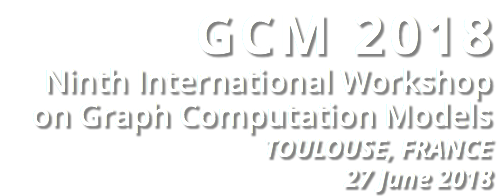


BACKGROUND AND AIMS
Graphs are common mathematical structures that are visual and intuitive. They constitute a natural and seamless way for system modeling in science, engineering and beyond, including computer science, life sciences, business processes, etc. Graph computation models constitute a class of very high-level models where graphs are first-class citizens. They generalize classical computation models based on strings or trees, such as Chomsky grammars or term rewrite systems. Their mathematical foundation, in addition to their visual nature, facilitates specification, validation and analysis of complex systems. A variety of computation models have been developed using graphs and rule-based graph transformation. These models include features of programming languages and systems, paradigms for software development, concurrent calculi, local computations and distributed algorithms, and biological and chemical computations.
The aim of GCM 2018 is to bring together researchers interested in all aspects of computation models based on graphs and graph transformation techniques. The workshop promotes the cross-fertilizing exchange of ideas and experiences among researchers and students from the different communities interested in the foundations, applications, and implementations of graph computation models and related areas. Previous editions of the GCM series were held in Natal, Brazil (GCM 2006), in Leicester, UK (GCM 2008), in Enschede, The Netherlands (GCM 2010), in Bremen, Germany (GCM 2012), in York, UK (GCM 2014), in L'Aquila, Italy (GCM 2015), in Vienna, Austria (GCM 2016), and in Marburg, Germany (GCM 2017).
The workshop is co-located with ICGT 2018 (11th International Conference on Graph Transformation) and is part of the STAF 2018 (Software Technologies: Applications and Foundations) conference.
PRELIMINARY PROCEEDINGS
Aaron Lye: Decidability and Complexity of the Membership and Emptiness Problem of Fusion Grammars
Abdullah Alqahtani and Reiko Heckel: Model Based Development of Data Integration in Graph Databases Using Triple Graph Grammars
Nneka Ene, Maribel Fernandez and Bruno Pinaud: A Graph Transformation Approach for the Modelling of Capital Markets
Lars Fritsche, Jens Kosiol, Andy Schürr and Gabriele Taentzer: Short-Cut Rules – Sequential Composition of Rules Avoiding Unnecessary Deletions
Annegret Habel and Christian Sandmann: Graph Repair by Graph Programs
Christoph Peuser: From Hyperedge Replacement Grammars to Decidable Hyperedge Replacement Games
Michael Löwe: Double-Pushout Rewriting in Context
Detlef Plump and Gia Wulandari: Verifying a Copying Garbage Collector in GP 2
Martin Gogolla: Squeezer Graphs: Proposing a Simple Basis for Computing (Meta-) Model Features
PRELIMINARY PROGRAMME (Wednesday, 27 June 2018)
11.00 – 12.30
Michael Löwe: Double-Pushout Rewriting in Context
Annegret Habel and Christian Sandmann: Graph Repair by Graph Programs
Lars Fritsche, Jens Kosiol, Andy Schürr and Gabriele Taentzer: Short-Cut Rules – Sequential Composition of Rules Avoiding Unnecessary Deletions
14.00 – 15.30
Christoph Peuser: From Hyperedge Replacement Grammars to Decidable Hyperedge Replacement Games
Aaron Lye: Decidability and Complexity of the Membership and Emptiness Problem of Fusion Grammars
Detlef Plump and Gia Wulandari: Verifying a Copying Garbage Collector in GP 2
16.00 – 17.30
Nneka Ene, Maribel Fernandez and Bruno Pinaud: A Graph Transformation Approach for the Modelling of Capital Markets
Abdullah Alqahtani and Reiko Heckel: Model Based Development of Data Integration in Graph Databases Using Triple Graph Grammars
Martin Gogolla: Squeezer Graphs: Proposing a Simple Basis for Computing (Meta-) Model Features
TOPICS
GCM 2018 solicits papers on all aspects of graph computation models. This includes but is not limited to the following topics.
Foundations
- Models of graph transformation
- Parallel, concurrent, and distributed graph transformation
- Term graph rewriting
- Logics on graphs and graph transformation
- Formal graph languages
- Analysis and verification of graph transformation systems
- Foundations of specification and programming languages
Applications
- Software architectures
- Software validation
- Software evolution
- Visual programming
- Graph-based security models
- Design of specification and programming languages
- Workflow and business processes
- Model-driven engineering
- Dynamic graph algorithms
- Bioinformatics and system biology
- Social network analysis
- Case studies
SUBMISSION AND PUBLICATION
Authors are invited to submit two types of papers,
- regular papers of at most 15 pages and
- position papers, system descriptions or work-in-progress papers of 6-12 pages.
Papers should be produced with the LNCS style (LLNCS) and submitted as PDF files via the EasyChair submission page.
All submissions will be reviewed by the programme committee. Electronic proceedings will be available at the time of the workshop. Authors of selected papers will be invited to contribute to the joint post-proceedings of the STAF workshops, that will be published by Springer in the LNCS series.
IMPORTANT DATES
- 13 April 2018: abstract submission
- 20 April 2018: paper submission
- 11 May 2018: notification
- 1 June 2018: submission of final version for pre-proceedings
- 27 June 2018: GCM workshop
PROGRAMME COMMITTEE
Andrea Corradini
University of Pisa, Italy
Rachid Echahed
Laboratoire d'Informatique de Grenoble, France
Stefan Gruner
University of Pretoria, South Africa
Annegret Habel
University of Oldenburg, Germany
Dirk Janssens
University of Antwerp, Belgium
Barbara König
University of Duisburg-Essen, Germany
Hans-Jörg Kreowski
University of Bremen, Germany (chair)
Mohamed Mosbah
University of Bordeaux, France
Detlef Plump
University of York, United Kingdom
Leila Ribeiro
Universidade Federal do Rio Grande do Sul, Brazil
CONTACT